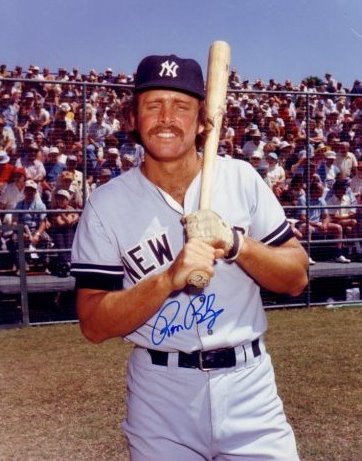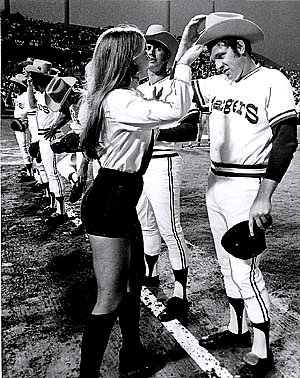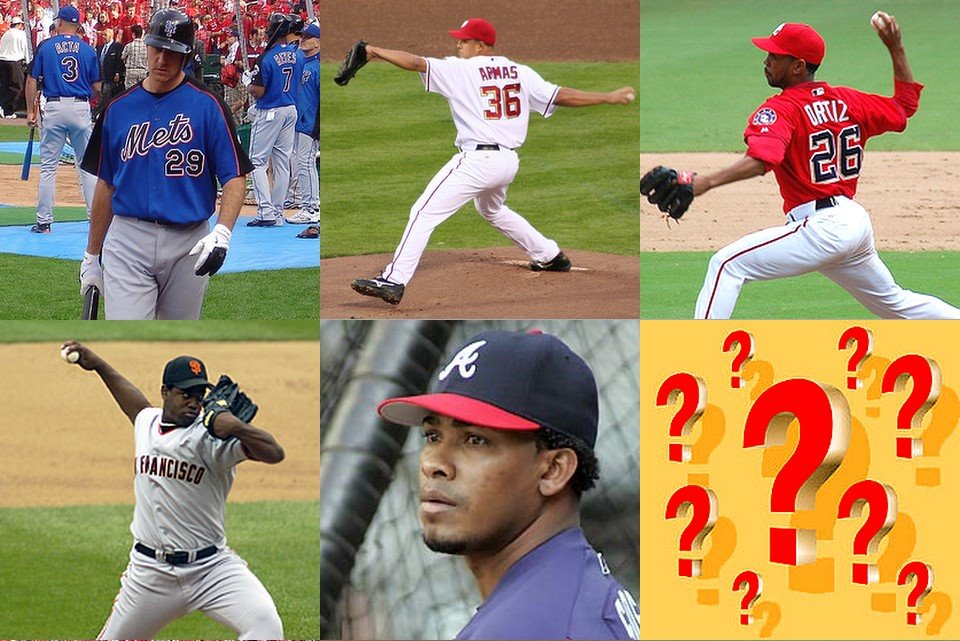THE YANKEES AND "SUPER JEW"
 [January 6th] -- [note: this story is in part about the way religion was discussed in the 1960's. Don't be offended. It's simply the way it was.]
[January 6th] -- [note: this story is in part about the way religion was discussed in the 1960's. Don't be offended. It's simply the way it was.]
In the late 1960's, about the only information a baseball fan could get about their team during the off-season was from the weekly Sporting News magazine. Even at that, all one could hope to find was a four paragraph story buried deep in the back of the magazine.
Even the Washington Post, one of the top newspapers in the nation, didn't cover the Senators during the winter save perhaps an occasional story when The Redskins or Bullets or Terapins weren't doing anything particularly noteworth.
I remember one story written by Shirley Povich in the winter of 1969. Povich had talked to someone within the Yankees organization and was reporting that a trade might have been in the works between the Yankees and Senators. Word had it, Povich said, that Bob Short was considering trading Mike Epstein to the Yankees for first baseman Joe Pepitone.
It was an interesting prospect. Epstein had the better year in 1969 (.278-30-85) vs. Pepitone's .242-27-70, but that w as Epstein's first full year in the major leagues. Pepitone, at 28 only three years older than Epstein, had already hit 166 career home runs. But the Yankees thought that Pepitone had peaked in 1966, and was backsliding just a bit.
as Epstein's first full year in the major leagues. Pepitone, at 28 only three years older than Epstein, had already hit 166 career home runs. But the Yankees thought that Pepitone had peaked in 1966, and was backsliding just a bit.
The Yankees, however, didn't think that Epstein was the better hitter despite his breakout 1969 season. No one believed that a straight up deal would be a fair trade for the Yankees. So why was were the two sides even talking?
Because Epstein was Jewish.
You have to remember that those were different times. Though laws forbade it, there were many parts of the Washington suburbs that were off limits to both African-Americans as well as Jews - 'red-lining' was the legal term, 'racism' its end result. People were still judged by their color or their race or their religion or their gender. Povich was not a racist - he was a fair and decent man. He simply wrote what we were thinking at the time. The decades that have passed make the words and the thoughts seem more evil than they really were in those days. That said, thank goodess we don't think that way any more.
The Yankees - the Yankees! - were having attendance problems. In 1969, they averaged just over 13,000 fans per game, more than a 40% drop since the beginning of the Roger Maris era. The team, still owned by CBS, was being run more like a television network than a baseball team. Rather than trying to field a better team, they were instead looking for gimmicks to increase their attendance.
Epstein would have been just such a gimmick.
Povich wrote that Pepitone (according to the Yankees) wasn't a drawing card because the team's history was replete with Italian players. A Jew, however, might excite the city's Jewish population into coming to Yankee Stadium. Amazingly, it was believed at the time that the reason there were so few Jewish athletes was due to their inferior talents. To find someone like Epstein, then, was a real "find."
There was another reason Pepitone was on the trading block. Though Povich never mentioned it, all serious baseball fans "knew" about the Yankee first baseman.
Pepitone, was -- well - - "you know."
- "you know."
In the days of baggy uniforms and tobacco stained jerseys, Joe Pepitone stuck out on the playing field. Each season, he would take the uniforms the Yankees issued him in spring training and have them custom tailored (look how loose team-mate Moose Skowron's uniform fit when compared to Pepitone's). There were eight Yankees running around in uniforms that looked two-sizes two big and then there was "Mod" Joe, who's uniform was a perfect fit.
C'mon Joe, that's just not manly!
But -- there was more.
After taking their shower, the majority of Yankees would goo up their hair with Vitalis and comb in a nice little rabbit-ridge along the front. There. Done. Fifteen seconds later they were putting on their street clothes. When the crowd cleared, Pepitone would saunter up to the mirror with his professional grade blow dryer and styling brush. Fifteen minutes. Twenty minutes. Whatever it took. He looked marvelous.
And while baseball players were buying Western Auto franchises or opening hardware stores for their retirement, Pepitone opened a chain of "My Place" hair salons for men. Pepitone himself was a hair stylist.
He was just too weird for the time.
Now, remember -- this was 1969. You know what we all thought. This was before 'Stonewall' and before "don't ask don't tell" came into being. The guy wore form fitting uniforms and packed a hair dryer for crying out loud.
Pepitone was no John Wayne, that's for sure.
In the end, Epstein stayed in Washington and Pepitone stayed in New York. Thank goodness times have changed and that a player's race and religion and possible orientation (Pepitone was straight -- weird -- but straight) no longer factor in to trades or roster spots.
But it wasn't just the teams that played on Epstein's religion. We all know that Frank Howard's nickname was "Hondo." Epstein had a nickname too.
"Super Jew."
Like I said, times have changed.
Just because the Yankees didn't get Epstein doesn't mean that they didn't get their drawing card. In 1967, they drafted a southern gentlemen from Dekalb Community College with the first pick of the first round.
His name was Ron Blomberg.
After hitting 35 minor league home runs over three seasons, Blomberg was called up in September of 1969, playing sparingly in the outfield. Perhaps his presence on the roster is what gave the Yankees the idea to go after Epstein. He returned to the big leagues for good in 1971, and played in 461 games with the Yankees and White Sox before retiring in 1978. He was a great hitter - he had a .293 career average. The problem was injuri es. Call him the Alex Escobar of his generation.
es. Call him the Alex Escobar of his generation.
Blomberg understood the relationship between the fans and his religion. He saw the opportunity to play before large crowds as a sign that he was "a chosen one among the chosen people," a reference Blomberg would make to his beliefs. Like Jewish stars Hank Greenberg and Sandy Koufax before him, Blomberg refused to play ball on the High Holy Days, but as a part-timer - and admittedly not a Hall of Famer like his predecessors - his stand garnered less notice (Epstein on the other hand was willing to play on those days). Blomberg, with yet another tip-of-the-cap to his faith, titled his memoirs "Designated Hebrew," a reference to his being the first designated hitter in the history of the American League (he walked against Luis Tiant and forced in a run).
By the time Blomberg's injuries forced him to retire, baseball no longer cared about race and religion. I guess that's why Povich's article is etched in my memory these many years later - I found it strange even then to consider Mike Epstein a "Jewish" player or Joe Pepitone an "Italian" player.
To me, they were all heros.
Except Pepitone. Man, that guy was weird!
The Best & The Worst Of 1972: The best - and the worst - of 1972 is depicted in this photograph. The date is April 21st, 1972, the first opening day in the history of the Texas Rangers. That was the worst of 1972. The best? Well, the hotpants, of course. I was only ten or so when girls first started wearing mini-skirts, so although I noticed girls who wore them, I didn't notice them, if you get my drift. But by the time hotpants came to be, I was a very hormonal 15 year old.
this photograph. The date is April 21st, 1972, the first opening day in the history of the Texas Rangers. That was the worst of 1972. The best? Well, the hotpants, of course. I was only ten or so when girls first started wearing mini-skirts, so although I noticed girls who wore them, I didn't notice them, if you get my drift. But by the time hotpants came to be, I was a very hormonal 15 year old.
I noticed them!
The reason that I preferred the hotpants was the way they gripped the girl's ... um ... backside. Though the miniskirt was short and showed a lot of leg, the material was fairly loose on the body. The hotpants, on the other hand, were so tight that you could map out every birthmark and pimple on the backside.
Hotpants didn't make up for the loss of the Senators, but they did make me care just a little less.
S-A-T-U-R-D-A-Y M-O-R-N-I-N-G U-P-D-A-T-E
Nats make pitch to five. Bill Ladsen reported on Saturday morning that the Nationals have tendered offers to five pitchers, Jerome Williams, Tony Armas Jr., Ramon Ortiz, Jorge Sosa and Steve Trachsel. Amounts of the contracts range from $500,000 to $3 million dollars.
Without getting specific, Ladsen says that Jim Bowden is willing to sign more than one among the group -- how many is unclear.
Let's take a quick look at the hopefuls:
Tony Armas Jr. [2006: 9-12, 5.03 in 154 innings]: No. Armas has been injured for much of his career, never having be en able to show what he could really do when healthy. In his one full year prior to 2005, he went 12-12, 4.44 (in 2002). I'm afraid the real Tony Armas lies somewhere between the so-so 2002 and the really bad 2006. I don't want him back.
en able to show what he could really do when healthy. In his one full year prior to 2005, he went 12-12, 4.44 (in 2002). I'm afraid the real Tony Armas lies somewhere between the so-so 2002 and the really bad 2006. I don't want him back.
Ramon Ortiz [2006: 11-16, 5.57 in 190 innings]: Yes. Oritz' 2006 was actually a little worse than Armas', but if the purpose of hiring a bottom-feeder free agent is to eat innings and not win games, then Ortiz is the guy by virtue of his better track record at staying healthy.
Steve Trachsel [2006: 15-8, 4.97 in 164 innings] No. A big concern with Trachsel is his age (36), and that 2006 wasn't just an off-year, but rather all those innings over all those year finally taking it's toll. His basereunners per 9 innings increased from 10 in '05 to nearly 15 last year while strikeouts went down from 6 per 9 innings down to just 4. Perhaps offer him a minor league contract, but nothing more.
Jorge Sosa [2006: 3-10, 5.46 in 87 innings] No. Take away 2005's 13-3, 2.55 season with Atlanta and Sosa has a career mark of just 13-33, 4.91. Even a minor league contract scares me.
Jerome Williams [2006: 0-2, 7.30 in 12 innings] Yes. First, the kid is only 25. Second, injuries have slowed his progression, not his talent. He was once considered a top prospect in the Giants' organization. Williams has a 23-24, 4.03 career major league record, quite good considering the value of the contract he'll be signing for.
He did well in his two full major league seasons, going 10-7, 4.24 as a 22 year old with the Giants in 2004, allowing just 11 baserunners per 9 innings. With the Cubs the following year, he went 6-8, 3.91.
Williams is without question worth the look this spring.
If, as Ladsen suggests, the Nationals sign two among this group, then there will only be two starting spots in the rotation available for Mike O'Connor, Shawn Hill, Beltran Perez, Matt Chico, and the rest of the gang. I still don't see the reasoning behind bringing in failed free-agents and slowing the progression of the baby-Nats unless Bowden will be trading them by July 31st for more prospects and then letting the kids start the final two months of the season.
If that's his reasoning, then I'm content. But if he's just trying to win a few more games, things are likely to turn ugly.
As I stated the other day, Williams is a decent person to take a chance on. I'm still for Ohka, if he wants to come here. Ortiz, Sosa, Armas & Trachsel, in that order for the rest.
I think we are also seeing a worry from the team that the starting pitching may well be more awful than they originally felt, although, all of us, have seen it coming for some time.
Thanks for the kind comment on my latest Hondo Story. I think I have used them all up now.
I also partly share the concerns expressed by some elsewhere in the blogosphere about rushing our developing young pitching talent to the big leagues before they're ready, and having them flameout as a result of insufficient maturity and preparation. There may be merit in getting a couple of veteran guys who can at least absorb innings, even if they don't succeed all that well.
I guess guys do that pretty often, but it was the first time I remember it being so obvious, and it was great.
<< Home





